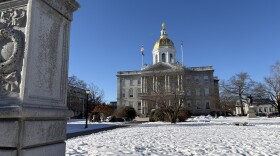It’s already been a cold winter, and we haven’t even hit January. Keeping the heat running and lights on night after night quickly adds up.
Across the state, homeowners are getting creative about ways to keep costs in check and, in some cases, transition to renewable fuel at the same time. In the Upper Valley, one city is particularly out front on this challenge.
When Devin Wilkie was shopping for his first home, he honed in on Lebanon in part because he knew city leaders here were prioritizing energy issues, just like he was.
Wilkie decided to invest in a centuries-old fixer-upper near the city’s main square. He was ready for a project, a challenge, he said. Still, he was surprised to go through about 1,000 gallons of heating oil last year, his first winter in the home. “It was somewhat shocking,” he said.
This season, Wilkie pre-purchased oil to lock in a better price. But he’s also fighting to keep heat from escaping so easily, investing in sealing small holes in walls, windows and floors. These patches can result in significant savings, a fact Wilkie learned through volunteering with a local program offering discounts to homeowners for weatherization work.
He’s on a limited budget, but eventually he’d like to install solar panels to bring the house as close to net-zero as possible.
Lebanon is one of a handful of New Hampshire cities to declare intentions to stick to the goals of the Paris climate agreement. Meeting that mark, though, is easier said than done, particularly in a state that’s lagged behind its neighbors in facilitating renewable energy development.
Still, Lebanon has several advantages, including political will, resources, and local experts with years of experience in the technical details of energy policy. That’s allowed the city to push forward in innovative ways.
For one, it’s the first, if not the only, community in New Hampshire to create a dedicated staff position to monitor and reduce local energy use. Tad Montgomery recently started in that role. “My hope is that people look at what I’m doing here - what the city is doing here,” he said, “and say whoa, yea, there’s actually tremendous value in having people who focus on these issues.”
Montgomery has run, or is on track to run, energy audits of key city buildings, including the water and wastewater treatment plants, police station, city hall and library. The audits examine at how the facilities could be operated more efficiently.
He’s looking to replace existing street lights with LEDs. This has been done in other communities, but Montgomery would like to make the lights in Lebanon dimmable, using less energy depending on traffic patterns, time of day, or even the brightness of the moon.
"My hope is that people look at what I'm doing here - what the city is doing here, and say, whoa, yea, there is actually tremendous value in having people who focus on these issues." ~ Tad Montgomery
The city is also moving forward with projects to generate electricity on city-owned property, from solar panels and methane gas captured at the landfill.
These projects promise to reduce the city’s municipal electric bill, reducing the amount of tax money spent on energy.
But at the same time, Montgomery and other city leaders are working toward solutions to offer more direct savings to residents.
Working with the state Public Utilities Commission and Liberty Utilities, their hope is to build a platform through which residents and businesses can buy and sell locally generated energy. That could mean purchasing power from municipal solar or landfill gas projects, or from neighbors with solar panels on their roofs.
The effort, many details of which are still being worked out, is called Lebanon Community Power.
Participating customers would pay variable rates for their electricity over the course of the day – higher rates when demand is high, lower when demand is low – and have control over the type of energy they were purchasing, allowing them to opt away from fossil fuels.
Such a system would offer particular savings to those who can shift their electricity usage to off-peak hours. Greg Ames, another city resident who has been involved in local energy-planning efforts, falls in that category. He drives an electric car which he can charge overnight, when rates are low.
Ames, who has solar panels on his roof, is also intrigued by the idea of being able to sell excess power back to neighbors at a rate higher than that currently contracted with the utility.
To him and others, Lebanon Community Power is about sustainability and cost savings, but also setting an example for what’s possible in other communities in the coming years.
“If we can get this platform … up and running here and it becomes replicated,” Montgomery said, “then New Hampshire could be the leader in this area in a short number of years.”







